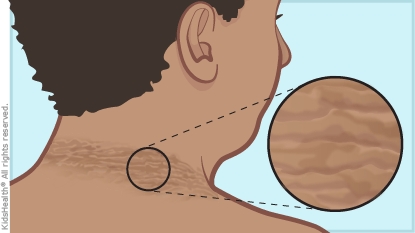Corporate Circle Members
40 Exchange Place, Suite 1902, New York, NY 10005
Phone
917.746.8300
Members Only
877.662.7627
© 2020 NAPNAP, Inc. All rights Reserved
Acanthosis nigricans (pronounced: ah-kan-THO-sis NY-gruh-kans) is a skin condition. It causes thicker and darker patches or streaks, usually in skin creases and folds, such as the sides and back of the neck, armpits, elbow pits, and groin. But it can show up anywhere on the body. It may look velvety or warty, or have a dirty appearance.
Acanthosis nigricans appears gradually with dark, velvety patches of skin in body creases and folds, usually in the neck, armpits, or groin. It can be found on other parts of the body, including the face, chest, elbows, knees, and knuckles. It can cause mild itching, but this is uncommon.

Acanthosis nigricans is most commonly caused by high blood insulin levels, a condition called insulin resistance. Insulin resistance is seen in people who are overweight or obese, and makes them more likely to develop type 2 diabetes. It is also associated with other endocrine conditions, such as polycystic ovary syndrome (PCOS).
Sometimes, acanthosis nigricans can be hereditary (passed on to a person by their parents) or part of a genetic syndrome. It can be caused by medicines, such as oral contraceptives or steroids.
Doctors can diagnose acanthosis nigricans by looking at the affected skin.
Acanthosis nigricans itself isn't harmful or contagious. But it can be a sign that a person is at risk for diabetes. So the doctor may order blood tests to look for diabetes or other conditions associated with it.
Treating the underlying cause of acanthosis nigricans can make the dark patches of skin fade or even disappear. This can mean stopping any medicine that’s causing the problem or treating diabetes and other health conditions.
Losing weight will help acanthosis nigricans fade. If you’re concerned about your weight, talk to your doctor before going on a diet.
Doctors may prescribe creams or lotions that can help lighten the skin. But most of the time, acanthosis nigricans doesn’t need treatment.
Skin areas with acanthosis nigricans can look dirty, but they’re not. Scrubbing the skin does not help and can irritate it. Gently clean the skin and don’t use bleaches, skin scrubs, or over-the-counter exfoliating treatments.
Eating a healthy diet and getting regular physical activity can help lower insulin levels and improve skin appearance. It can help to:

© 1995- The Nemours Foundation. KidsHealth® is a registered trademark of The Nemours Foundation. All rights reserved.
Images sourced by The Nemours Foundation and Getty Images.
New UsersCreate a User AccountBecome a Member |
Forgot PasswordForgot your password? Click here |
